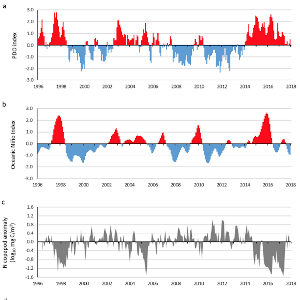Long-term mechanistic research and monitoring provides integral science support for ecosystem-based management (EBM) of resources, activities and services. Decades of oceanographic and ecological research by Bill Peterson and colleagues along the Newport Hydrographic Line (NH Line) provides essential context for understanding and managing Pacific salmon Oncorhynchus spp. and other marine resources in the California Current ecosystem. This research program helped federal scientists convey the significance of the northeast Pacific marine heatwave (2013–2016) to fisheries managers and stakeholders. Particularly illustrative were shifts in the composition of the copepod community, which reflected feeding conditions for Pacific salmon and other consumers. We identify six traits of the dataset produced by Peterson and colleagues that have made it especially valuable for informing management: (i) it has generated robust ecosystem indicators; (ii) it is long-term; (iii) it is associated with meaningful ecological mechanisms; (iv) it relates to ecosystem components of high societal value; (v) it can represent processes and lags at meaningful temporal scales; and (vi) it is part of a broader, integrative science effort. This research effort underscores the importance of developing and sustaining long-term mechanistic research and monitoring along the U.S. West Coast and elsewhere in the world.
The importance of long-term ecological time series for integrated ecosystem assessment and ecosystem-based management
Publication date
October 21, 2020
Abstract
Journal
Progress in Oceanography
Region
California Current


